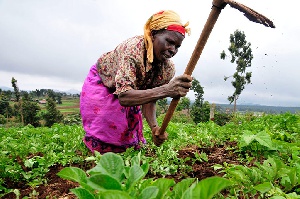- Home - News
- TWI News | TV
- Polls
- Year In Review
- News Archive
- Crime & Punishment
- Politics
- Regional
- Editorial
- Health
- Ghanaians Abroad
- Tabloid
- Africa
- Religion
- Election 2020
- Coronavirus
- News Videos | TV
- Photo Archives
- News Headlines
- Press Release
Business News of Friday, 12 April 2013
Source: Daily Guide
Agric sector records lowest growth
Ghana’s agriculture sector recorded the lowest performance, the revised GDP estimate for 2012 released by the Ghana Statistical Service has revealed.
In its recent quarterly, GSS noted that Ghana’s services sector recorded the highest growth of 10.2 percent followed by industry (7.0 percent) while agriculture recorded the lowest growth of 1.3 percent.
It said within the agriculture sector, the crops subsector (including cocoa) recorded one percent growth rate while the forestry subsector grew at -1.4 percent. The fishing and livestock subsectors grew by 4.7 percent and 5.0 percent respectively. Minister of Agriculture, Clement Kofi Humado, expressed concern about the low growth of the sector in spite of the high budgetary allocation by Government.
According to him, government has exceeded the 10 per cent budget support to the agricultural sector but that has not reflected in growth. The minister attributed the trend to the increasing expenditure on emoluments and administrative purposes rather than investment.
He was speaking on the sidelines of the 9th Comprehensive Africa Agricultural Development organized under the auspices of the Africa Union in Addis Ababa Ethiopia recently. Ghana, a signatory to the Maputo protocol in 2003, has been making efforts to comply with arrangements under the protocol.
An expenditure review has established that the quality of expenditure is challenging since a chunk of resources go into settling emoluments but not into investments.
A couple of years ago, Haruna Iddrisu, now Trade & Industry Minister, warned that Ghana has over the decades relied heavily on agriculture as the backbone of her economy and should therefore be careful not to desert agriculture in favour of the new oil production. The agriculture sector employs over half of Ghana’s population and contributes immensely to Gross Domestic Product (GDP) as well as its export earnings.
Despite her vast fertile lands and river bodies, Ghana’s agriculture sector remains largely driven by traditional farming methods. Rather, it has had to import of large quantities of rice, onions and other foodstuffs that could be cultivated locally.
Civil society organisations in the agriculture sector recently warned that Ghana’s recent growth rate of between six and seven percent cannot be sustained if the rate of depletion of the country’s natural resources and environment are not checked. It is estimated that Ghana loses some 10 percent of its GDP through unsustainable management of her resources.”











